The U.S. Department of Energy’s (DOE) Office of Fossil Energy and Carbon Management (FECM) welcomes the 2023 Mickey Leland Energy Fellowship (MLEF) Program cohort of fellows. This year’s program includes 56 undergraduate and graduate students representing 43 academic institutions with 37% of participants attending a Minority Serving Institution (MSI). Participants also represent 20 states, Washington, D.C., and Puerto Rico. This diverse group of fellows will bring a unique perspective and skillset to the MLEF Program.
The MLEF program was created in 1995 to improve opportunities for under-represented students in STEM fields and strengthen a diverse pipeline of future STEM professionals. The program offers hands-on research and development experience under the mentorship of world-class scientists, researchers, and program managers.
This year’s fellows will complete their research projects with several DOE FECM offices and National Laboratories. The program will conclude in August with a Technical Forum where participants will present their research findings. We look forward to hosting these amazing students and are excited about their contributions to the mission of FECM; to minimize the environmental and climate impacts of fossil fuels and industrial processes, while working to achieve net-zero emissions.
To learn more about the MLEF, including how to apply, click here. Read below our student spotlights to learn more about this year’s participants.
Meet the 2023 MLEF Fellows

Eugenia Korankye
Eugenia Korankye is a senior majoring in computer science at Clayton State University. This summer, Eugenia was stationed at the U.S. Department of Energy Headquarters in Germantown, MD, where she conducted a study of a mock power plant company to assess its potential profitability.
The mock power plant Eugenia created for this study was a silicon power plant that would produce silicon compounds, silicon wafers for solar cells and electronic semiconductors, and enhance the properties of aluminum. She began her study by researching literature and consulting with finance professionals to gain insight of financial aspects of power plant operations, market dynamics, and industry best practices. Next, she employed financial calculations for evaluation of the plant’s profitability, which included data analyzation, programming with known languages, and using modeling software.
Eugenia’s passion for learning and aspiration to contribute to innovative technological advancements that create positive global change are what inspired her to apply for the MLEF program. As a result of her project, Eugenia gained a deep understanding of how entities use techniques for forecasting energy demand and pricing, assessing profitability under different scenarios, and determining risk analysis and management.
Aside from constantly looking for opportunities for professional and personal growth, Eugenia loves to take long walks and listen to music! She can also eat ice cream for breakfast, lunch, and dinner.
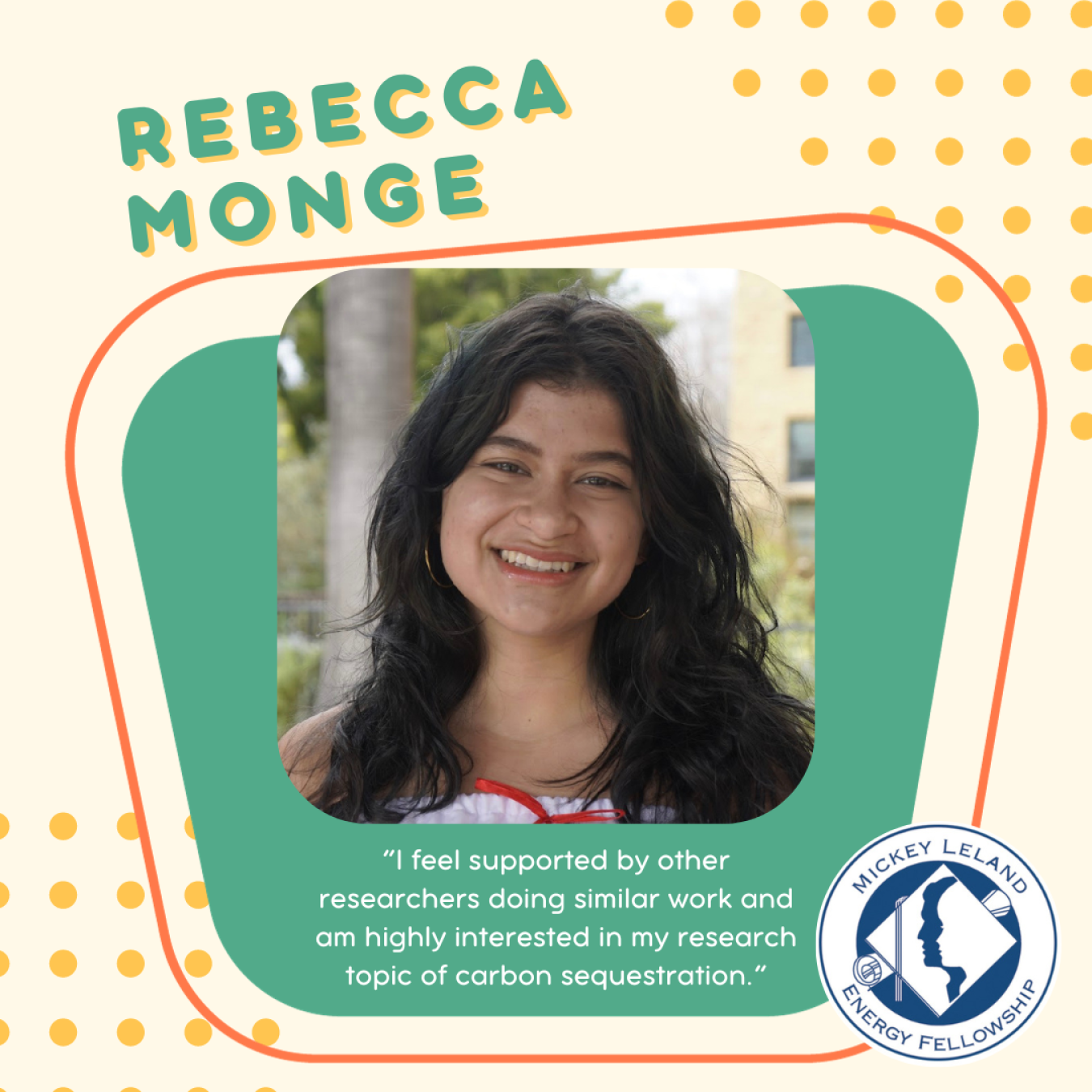
Rebecca Monge
Rebecca Monge is a junior at Stanford University majoring in Earth Systems Science. This summer, Rebecca was at Lawrence Berkeley National Laboratory where they worked on a carbon sequestration project. Specifically, Rebecca’s project was focused on studying the effects of enhanced rock weathering on soils to capture and store carbon dioxide.
Rebecca’s research consisted of quantifying and comparing the difference in carbon dioxide and soil properties in large pots of soil with and without the enhanced weathering additions to the soil; the enhanced weathering process included adding powdered rock to the soils. This work can be used on a larger scale to see how it could be applied to croplands to reduce atmospheric carbon dioxide and, further, preserve food production.
This work is close to Rebecca’s heart, as their goal of researching sustainable agriculture is to eventually assess how such technologies may benefit their homelands of Central America. Rebecca's Honduran and Costa Rican culture greatly influences their work, as both sides of Rebecca’s family taught them the importance of stewarding land. Earth and energy sciences allow Rebecca to reflect on their connection to the planet and desire to ensure an equitable future. Ultimately, Rebecca’s career goals involve incorporating this knowledge into designing and executing a carbon sequestration project, independently, and supplement the sovereign and environmental issues that still exist in Central America.
Rebecca was excited about being able to gain real-world experience in carbon sequestration through MLEF and gained valuable insight as to what a career in this field would look like. Outside of academia, Rebecca is passionate about creating art! They view it as an extension of their research and find it valuable to connect with the environment through this creative avenue.
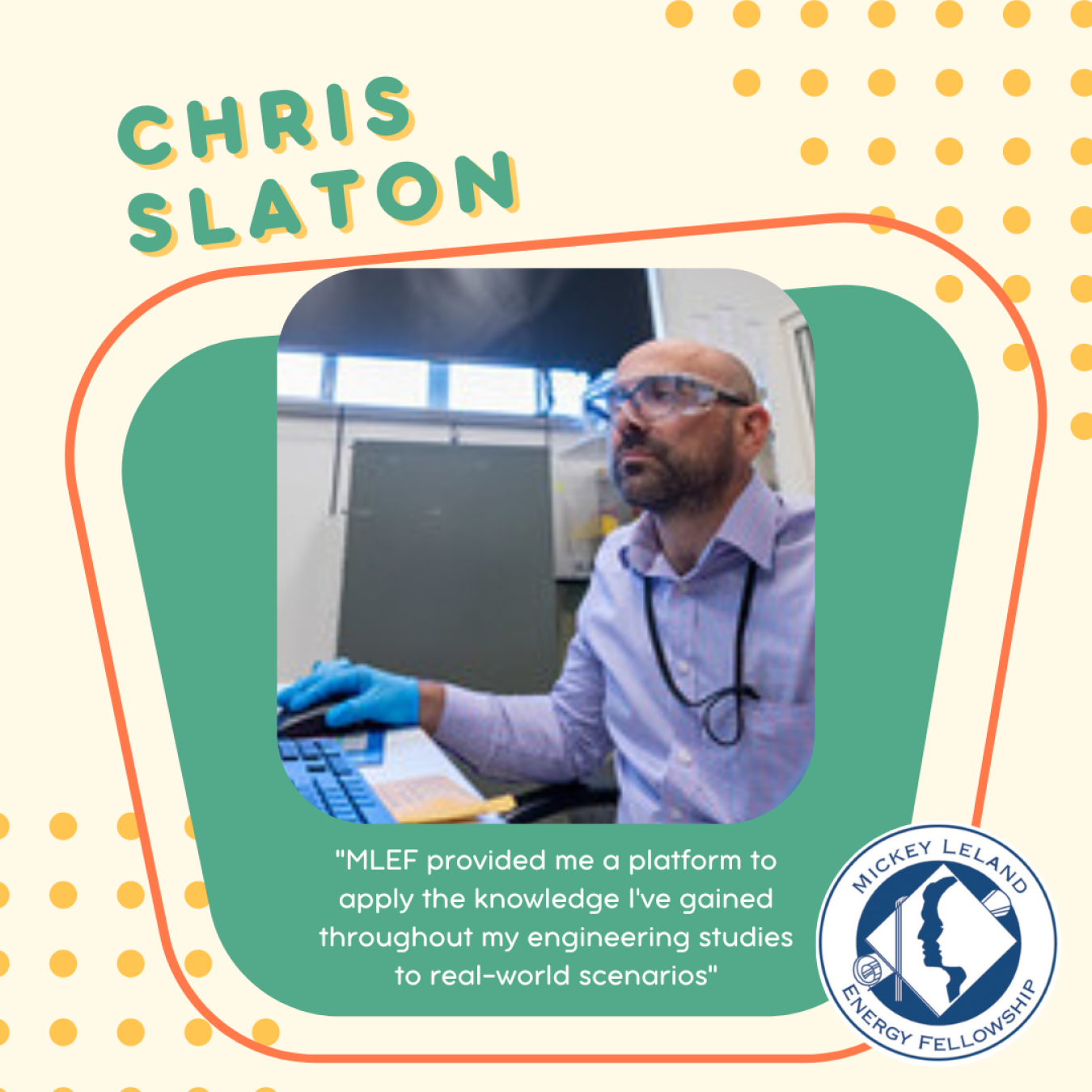
Chris Slaton
Chris Slaton is a senior at the University of Houston pursuing a degree in mechanical engineering. This summer, Chris was based at NETL Albany, OR where he studied the influence of carbon concentrations on the deformation and grain structure of nickel-based metals, or superalloys. Understanding the balance between a superalloys’ high temperature strength and fabricability would aid in finding both the optimal carbon concentration and processing parameters that would enable efficient manufacturing of the metal for new, clean power technology. Chris completed the study of these factors using characterization tools such as scanning electron microscopy and electron backscatter diffraction.
Chris learned about MLEF through his university’s communication channels and became excited to apply his knowledge of mechanical engineering in a real-life scenario. The prospect of using what he has previously learned combined with learning new skills in his field of study was what empowered Chris to apply. Chris hopes to use his lessons to pursue a Master’s in materials science and, eventually, have a career in the energy sector dedicated to the research and development of sustainable materials and energy solutions.
Outside of academia, Chris maintains an active lifestyle, while still saving time to relax by the pool!
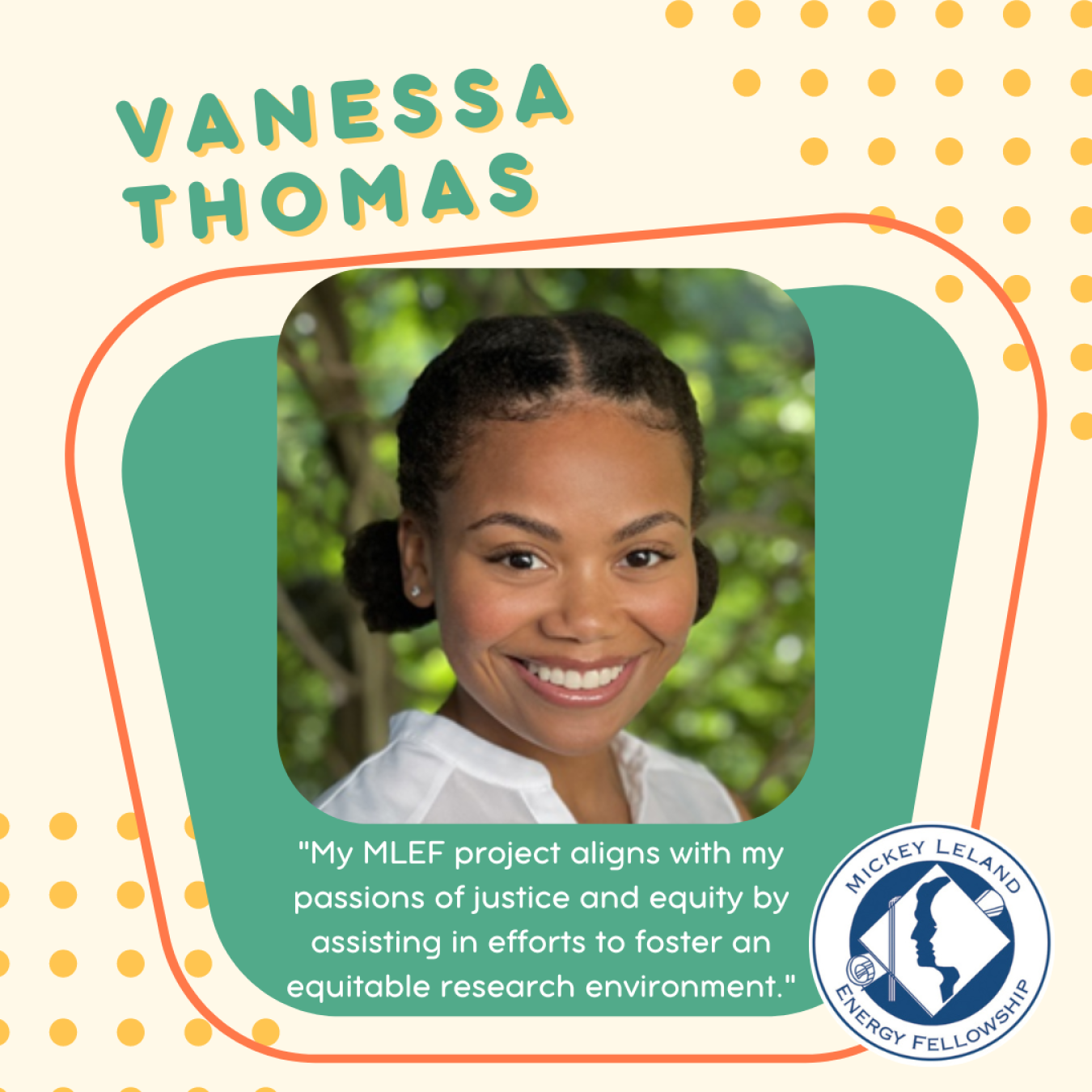
Vanessa Thomas
Vanessa Thomas is a recent graduate of Rutgers University where she attained a Bachelor of Science in Environmental Policy, Institutions, and Behavior in May of 2023. She also achieved a double minor in Social Justice and Sustainability. Vanessa’s MLEF project was based at DOE Headquarters and aimed to assess the research capacities of Minority Serving Institutions (MSIs) and determine the degree to which they align with FECM mission-related research.
MSIs are higher education institutions in the U.S. that have a primary mission of serving historically underrepresented minority populations. FECM’s University Training and Research Program (UTR) was designed to provide funding to MSIs and has recently been granted an increase in funding. To maximize the program’s impact, Vanessa’s project involved using NETL’s Tableau Tool, Jupyter, and Microsoft Excel to assess data from various databases and create a systematic review of MSI capabilities to perform FECM mission-related research. In doing so, she was able to provide recommendations that the UTR program can consider to meet the current administration’s decarbonization and equity goals.
Enhancing MSIs accessibility to UTR programs narrows the funding gap that MSIs face against better financially resourced non-MSIs. Vanessa was drawn to this project because she is passionate about environmental and energy justice. Her passion was sparked when she previously attended University of Maryland Baltimore County. It was her first time living so close to a metropolitan area having grown up in rural New Jersey. It became apparent to Vanessa the different lived experiences people had despite only living two or three streets apart.
Vanessa was excited to gain experience at the federal agency level because her work would have real world applications. The insight she gained from MLEF has kept her mind open to possible career paths after the program. Ultimately, she wants her career to revolve around the intersection of technology and policy and mitigating environmental health disparities.
Outside of her professional aspirations, Vanessa is an avid reader! She believes a good book can allow you to transcend space and time and change your entire life.
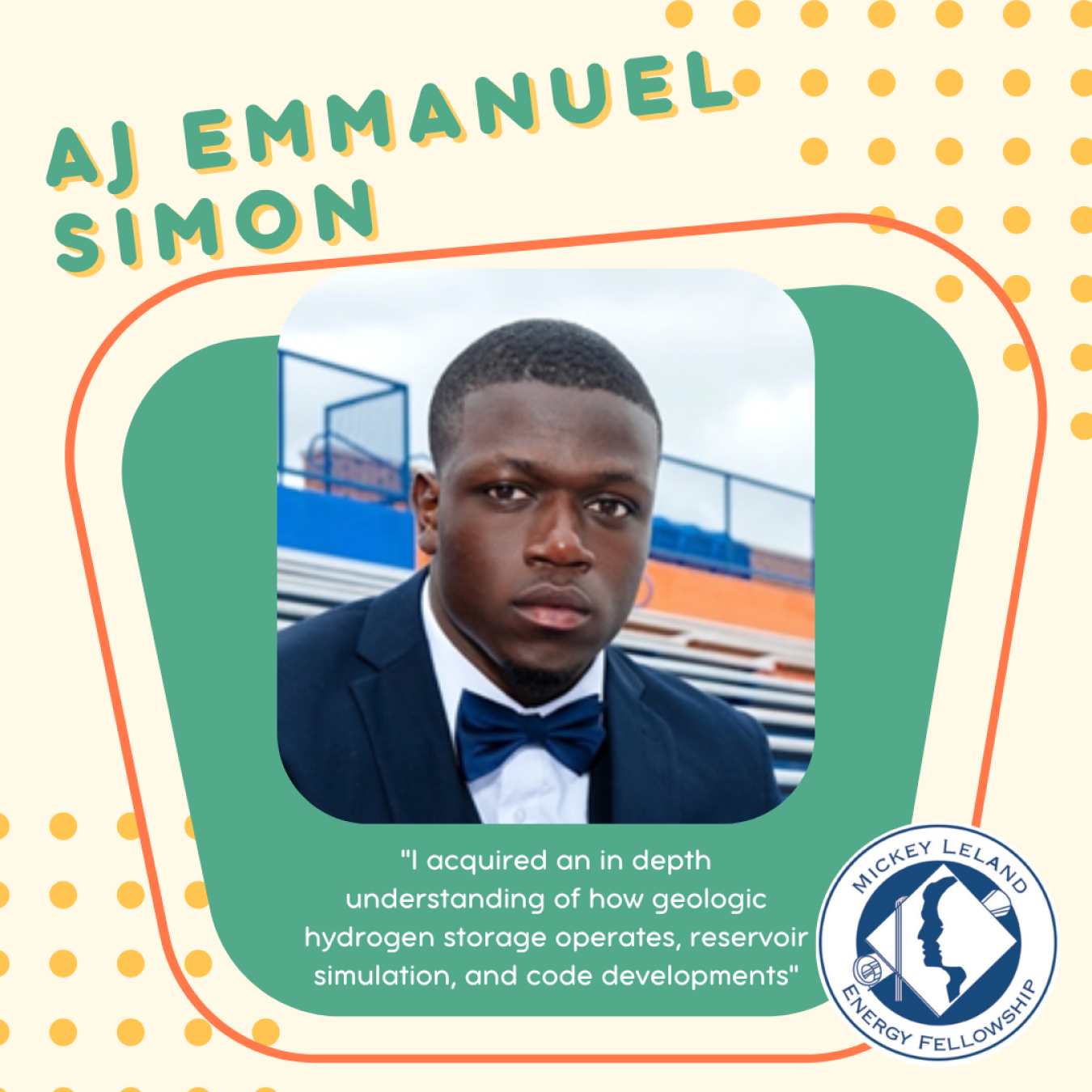
AJ Simon
AJ Simon is a graduate student at Virginia State University, pursuing his master’s in computer science. AJ’s 2023 MLEF experience had him based at Los Alamos National Laboratory in Carlsbad, New Mexico. AJ’s research was centered on developing a novel and rapid theoretical hydrogen leakage detection framework using scientific computing software, specifically tNavigator and Python, to construct coding.
Detecting hydrogen leakage in a timely, economically feasible, and reliable fashion is critical in the U.S., because while hydrogen is a versatile fuel in advancing more clean energy sources, it must be stored in large volumes in geologic formations for future use. While sites are carefully characterized and selected, hydrogen may still leak into other formations or the atmosphere, which can potentially result in operational, health, safety, and climate risks. The machine learning and coding utilized in the framework AJ assisted in developing for hydrogen detection was used to discover leakage levels of geologically stored hydrogen.
Technology has always drawn AJ’s attention, and the expanding field of A.I. and cybersecurity are of particular interest to him. After learning about MLEF from a recruiter in his Programming II class, AJ was confident that an experience at a national lab would allow him to gain valuable insight and knowledge about the technology and computer science industries he hopes to pursue after completing his education.
Outside of academics, AJ plays tight end for the Virginia State University football team! The perseverance, teamwork, and discipline he learned from football has helped him greatly in his academic career.
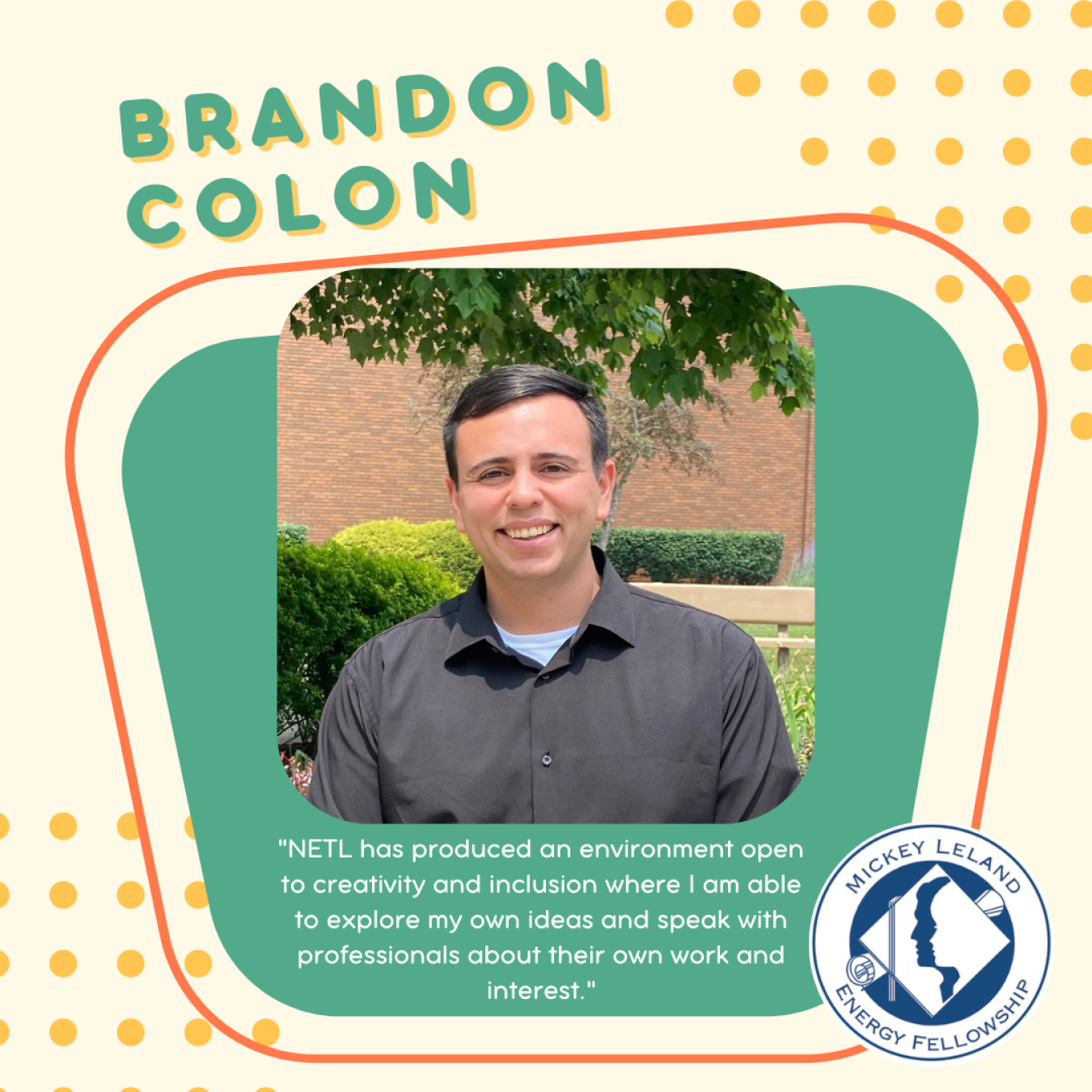
Brandon Colon
Brandon Colon graduated this spring from the University of Texas at San Antonio with a Bachelor of Science in computer engineering. Brandon spent the summer based at the National Energy Technology Laboratory (NETL) – Morgantown, where his project focused on the collection and arrangement of ambient weather data for energy systems and carbon capture analysis. He was tasked with creating a user-friendly Application Programming Interface (API) in Jupyter Notebook to collect the necessary historical hourly weather data and then display the statistical information for the potential user based on that data. Beyond having convenient access to various hourly weather data, the project mission was to describe ambient weather conditions as uncertainties in the optimization of the Techno-Economic Analysis (TEA) process.
When Brandon was young, he was fascinated (and frustrated) with his computer and gaming systems. His interest in computers grew as he did, which led him to pursue computer engineering as an undergraduate. He enjoys the versatility his degree offers him – from learning about core electrical engineering properties of circuits to how a machine is built and organized to handling user application. Brandon is excited about his future career.
MLEF has broadened Brandon’s career enthusiasm. He gained meaningful insight into what being a government employee looks like and how contractors align within NETL and DOE. MLEF had been on Brandon’s radar for a long time, after he learned about it at his university’s career fair. Brandon was reassured the program would be a positive experience at the MLEF kick-off event where he learned about the direct effect FECM had on his hometown of San Antonio through the Bipartisan Infrastructure Law in plugging orphaned wells.
Brandon plans to complete graduate school to advance in a career dedicated to public interest and service. Outside of his studies, Brandon enjoys exploring new places and environments, whether it be by backpacking, camping, or fishing.
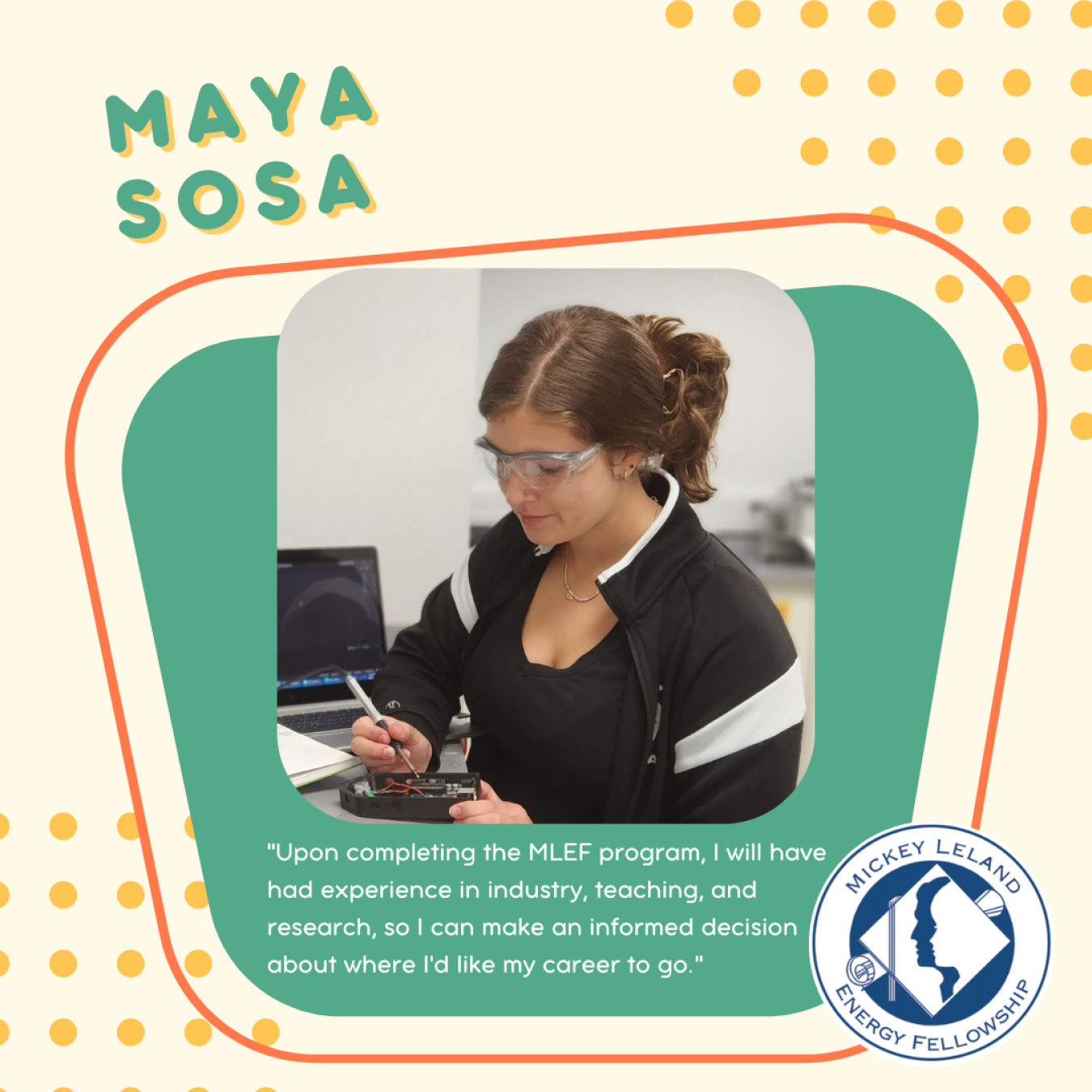
Maya Sosa
Maya Sosa is a rising senior at the University of Central Florida, where she is majoring in photonic science and engineering. This summer, Maya is based out of NETL-Pittsburgh, where her project is focused on optical fibers. Her primary focus is the design and assembly of a microcontroller circuit to be used with a halogen lamp or LED to produce a modulated light source. The goal will be to utilize optical fibers in a way that will aid in the pursuit of energy-efficient technology solutions.
Maya has always been a logical thinker and a problem solver. When she joined her high school’s Technological Student Association and, consequently, competed in a state-wide STEM competition, she was certain that she wanted to pursue a STEM career path. She hopes that her MLEF experience will guide her on deciding what professional avenue to pursue after graduating, since she will be exposed to research, education, and industry careers. Ultimately, her career goal is to work with renewable energy and be on the forefront of creating a greener tomorrow.
Growing up in Florida, Maya is fond of going on outdoor adventures, especially to the springs and beach. She also competed in color guard for 5 years!
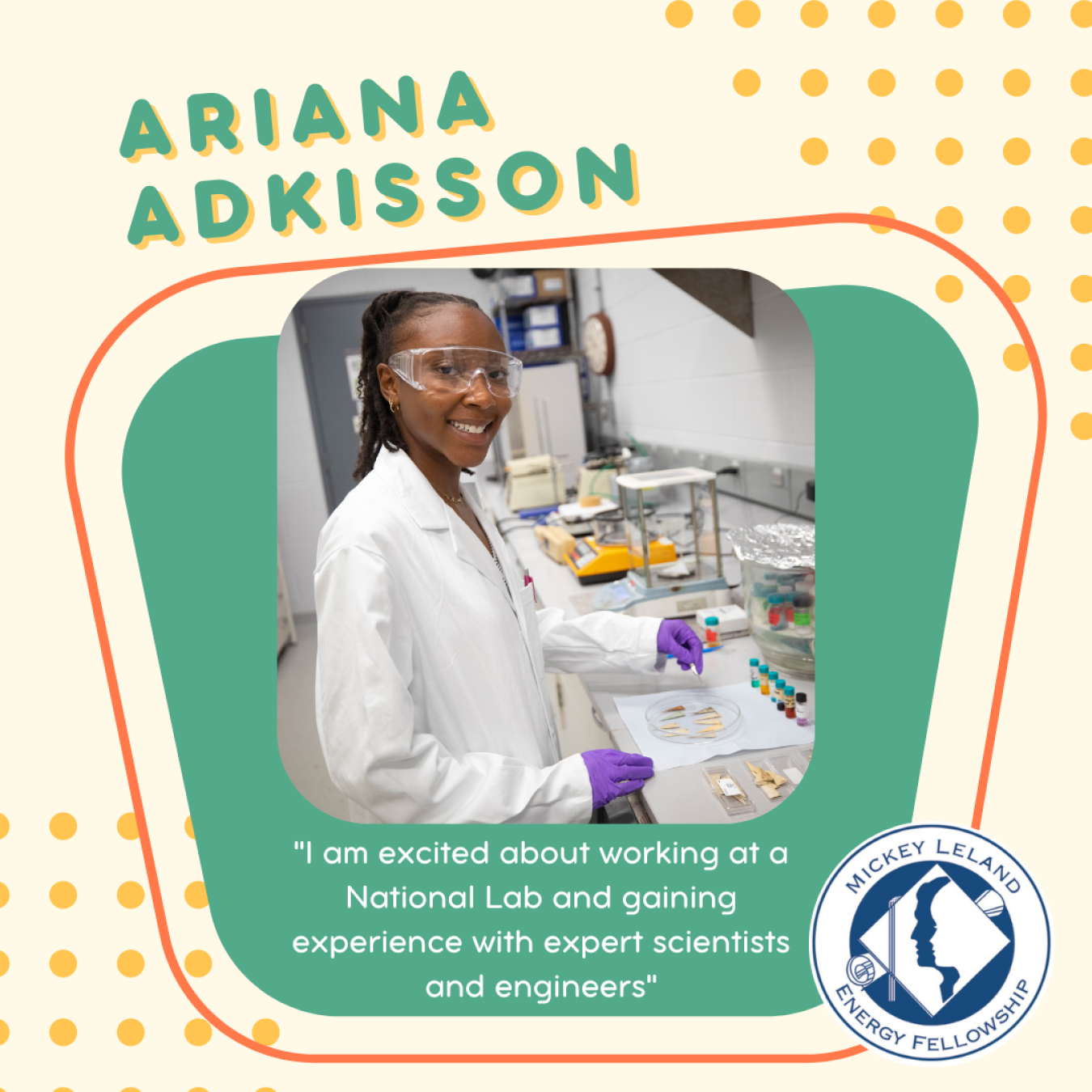
Ariana Adkisson
Ariana Adkisson is a senior at Norfolk State University majoring in Chemistry. This summer, she is conducting research at the National Energy Technology Laboratory (NETL) in Pittsburgh focusing on assisting in the advancement of NETL’s portable luminescent spectrometer to detect energy-relevant metal ions using carbon quantum dots. Luminescence is a phenomenon where certain materials emit light without being heated. Her research involves developing and testing new luminescent carbon dots, which are a cost-effective and highly fluorescent material that have shown promise in detecting metal ions. Metal ion detection is crucial, especially in complex environments like fly ash leachates, which contain acids and various metals. Traditional techniques like inductively coupled plasma mass spectrometry can be expensive and not easily transportable, making them less suitable for on-site of field-based analysis of metals, particularly in rare earth element-rich streams. This work will help NETL in significantly lowering the cost associated with characterization and processing these metal ions which will be beneficial for the increased manufacturing of ‘clean energy’ technologies such as electric vehicles, wind turbines, and solar panels which are vital for a sustainable and environmentally friendly future.
As a child, Ariana was an avid Sid the Science Kid and Magic School Bus watcher, which is what she attributes to her early affinity for anything STEM. Ariana’s mother provided her consistent support and encouraged her to pursue what she loves to do. That encouragement, paired with positive high school chemistry experiences, made Ariana confident in her decision to major in chemistry.
When her chemistry professor recommended MLEF, Ariana became excited about the opportunity to work in a national lab, gain experience with scientists and engineers, and collaborate on projects that will help tackle energy and environmental issues our world faces. Ariana is passionate about the energy and environmental crisis and plans to pursue a Ph.D. in chemistry after completing MLEF.
Outside the classroom, Ariana enjoys traveling, hiking, relaxing at the beach, planting, and spending time with her 2-year-old schnauzer!
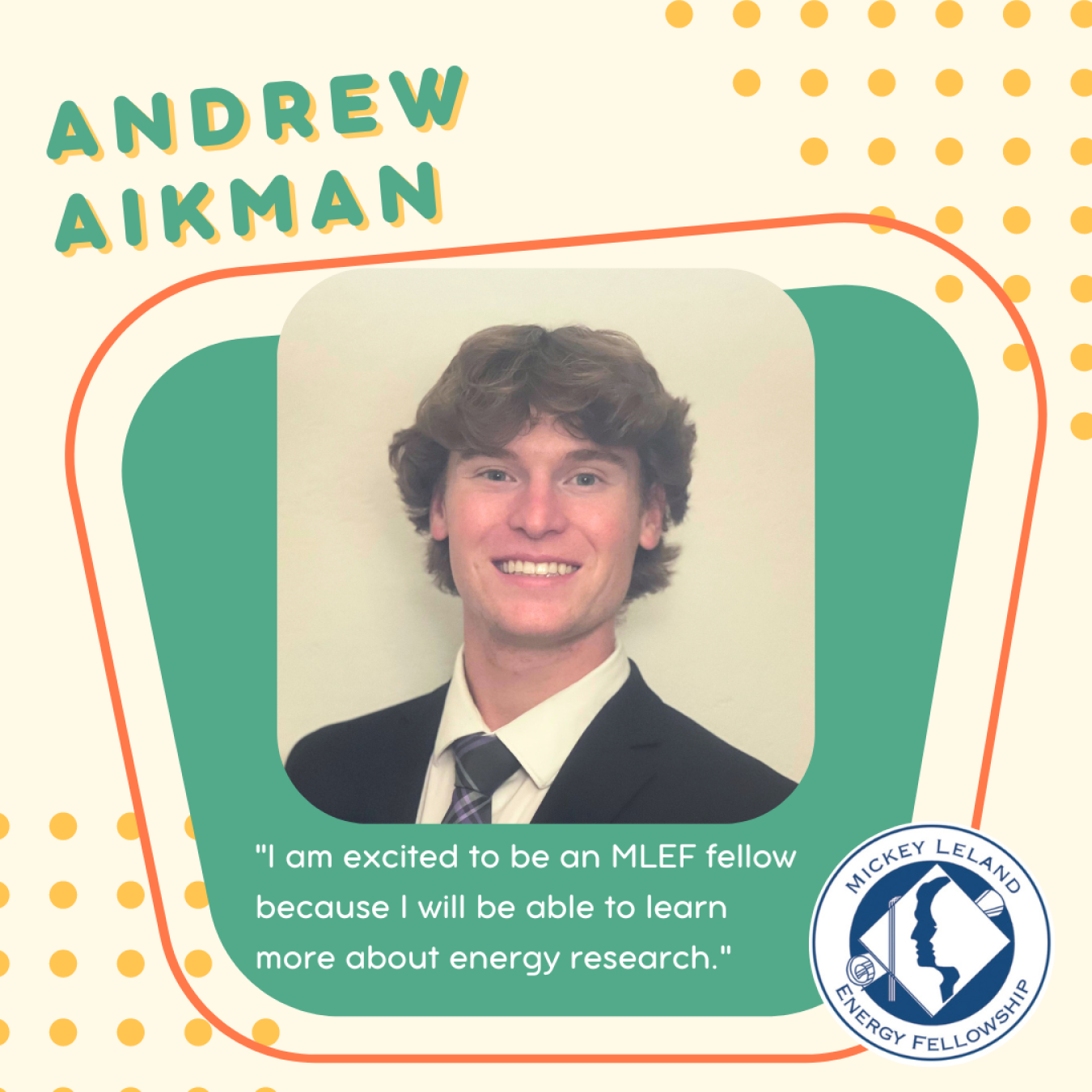
Andrew Aikman
Andrew Aikman is a graduate student at the Colorado School of Mines (CSM) pursuing a master’s in mechanical engineering. This summer, Andrew is based out of Lawrence Livermore National Laboratory (LLNL) in Livermore, CA and assisting with the Algae-Based Bioproducts Utilizing Sorbent-Captured CO2 (ALBUS) project. ALBUS is focused on creating a material that will avoid losing carbon to the atmosphere during the process of feeding useful algae pools while also maximizing the algae’s utilization. This will aid in FECM’s mission of achieving net-zero carbon emissions. Andrew’s main tasks include assisting with technoeconomic analysis and life cycle assessment, along with process analysis of the spool-automated system used to transport and cycle the ALBUS material to the algae.
While Andrew was not always sure about pursuing a STEM career, he always knew that math and science were his best school subjects. Following a broken hand that prohibited him from playing sports in college, and the positive influence of his mechanical engineer uncle, Andrew decided to pursue mechanical engineering as his undergraduate degree at Colorado School of Mines.
Andrew has been excited about the possibility of doing energy research since becoming connected to the MLEF program through CSM. He hopes to learn about more clean energy opportunities and strengthen his process analysis and research skills while serving as an MLEF fellow. Andrew plans to continue contributing to clean or renewable energy research while completing his graduate degree. Outside the laboratory, Andrew lives an active lifestyle and has joined a tennis group at LLNL. He also enjoys snowboarding back in Colorado.
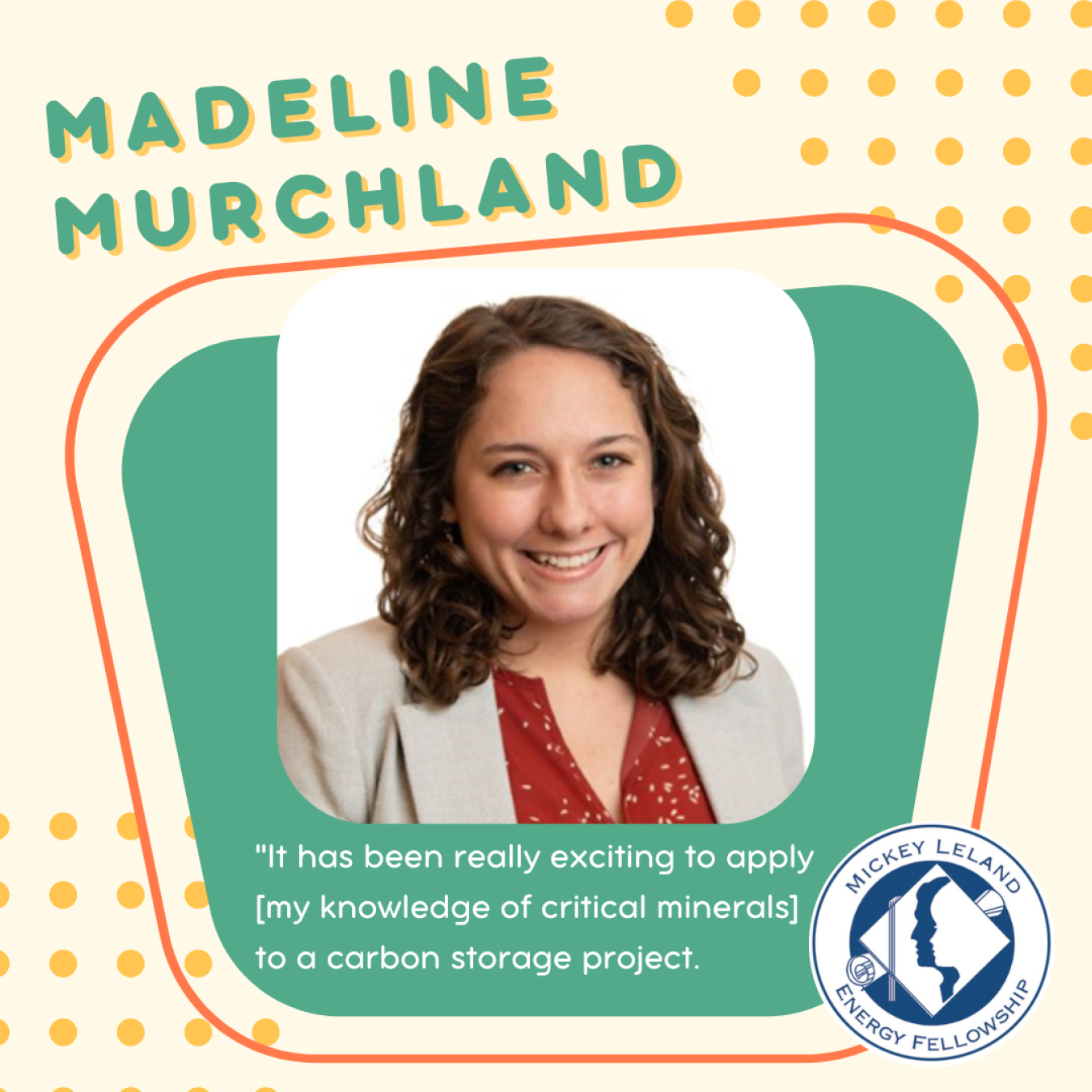
Madeline Murchland
Madeline Murchland is a graduate student at the University of Idaho pursuing a masters in geology. Madeline is based out of Pacific Northwest National Laboratory (PNNL) this summer, examining carbon mineralization in reactive subsurface reservoirs. Her work will provide a new facet to carbon-smart and carbon-neutral mining projects, as studying how trace metal in rock reacts during carbon storage that could eventually allow mines to store carbon stably as carbonates.
Having heard of MLEF from a former participant, Madeline was curious about how the program could aid her in completing her master’s thesis. As she settles into the program, she is excited about advancing her knowledge of PNNL’s analytical techniques and systems that can be further applied to Madeline’s future projects and thesis.
Madeline’s strong work ethic was fostered early in her life by her long-time involvement in competitive gymnastics. The lessons learned in gymnastics transitioned to her educational and professional career, as she entered the STEM field from a humanities/law & policy background. She never would have guessed that being required to take an off-major course would lead her to change majors entirely! Now, her career goals involve continuing in academia/research to do laboratory research that allows her to apply mineralogy and crystallography to solve real-world problems.
